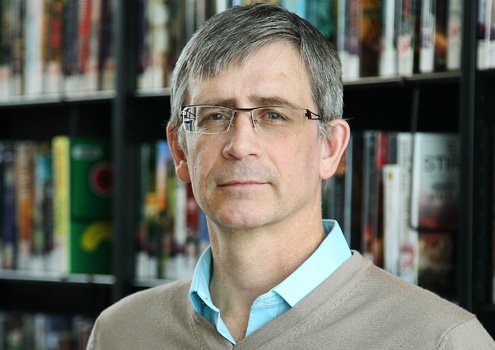Reading time: About 2 minutes
Thanks to his earlier career as a journalist, Bretton Loney says he learned that the act of simply putting his bum in the chair was essential to writing success.
Bretton Loney is a novelist and non-fiction writer who has independently published three books: The Last Hockey Player, a work of dystopian fiction; Joe Howe’s Ghost, a paranormal political novel; and Rebel With a Cause: The Doc Nikaido Story, a biography about a Canadian doctor. In the fall of 2025 he will publish a historical murder mystery, set in the early 1750s during the founding of Halifax, Canada by European settlers. He lives in Halifax, Canada with his wife, Karen Shewbridge.
I was excited to talk to Bretton about how he approaches writing.
Q. Roughly how much time do you spend writing every day?
When I am writing a book, I spend about two or three hours per day writing new material. It is the best part of my day. I might spend another hour or two editing in the evening.
Q. What’s a simple activity or habit that makes you a better writer?
Walking, walking, walking. So many ideas come to me, unbidden, by the calming motion of walking.
Q. What interferes with your writing?
Hopefully, nothing. Naturally, all life’s challenges, big and small, but I try to not let anything interfere with writing, which means making it a priority.
Q. How do you persuade yourself to sit down to write on days when you really, really DON’T feel like doing it?
As a former print journalist, I learned long ago that the act of simply putting your bum in the chair is essential to writing success. Also, as a former journalist, I learned to write on demand. Regardless of whether it’s a good day or a bad day, when it’s time to write, I write.
Q. Is there a particular motto or saying that you’ve found helpful for writing?
I am a big fan of the following quote from Irish novelist and playwright Samuel Beckett: “Ever tried. Ever failed. No matter. Try again. Fail again. Fail better.”
Q. Which stage of the writing process do you enjoy the most: researching, writing or editing/rewriting and why?
Frankly, I enjoy all aspects of the process. I enjoy researching, perhaps too much. I enjoy writing, even when it’s not going well, and I enjoy the editing/rewriting phase when you really begin to shape your book.
Q. What’s the best book you’ve read (either fiction or non) in the last five years?
Fiction: By Gaslight by Canadian author Steven Price or Wolf Hall by British novelist Hilary Mantel.
Non-Fiction:1599: A Year in the Life of William Shakespeare by American author James Shapiro.
Q. What book are you reading right now?
A Gentleman and a Thief by Canadian author Dean Jobb
Q. What do you think is the biggest misperception that new writers have about the act of writing?
I think this idea that you must be inspired by the muse, that writing – particularly fiction – is some kind of magical, mystical process. It’s not. It’s really about having an idea, marrying that with a bit of planning and research, and then doing the focused work of writing. That’s it.


